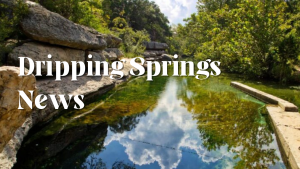Concerns over the method Wimberley city leaders should take to alleviate wastewater woes drove hundreds to the Wimberley Community Center last week to hear what one group feels is the best way to proceed.
The Citizens Alliance for Responsible Development (CARD) held a town hall meeting to voice their support of a plan that would expand the city’s wastewater system to 75,000 gallons per day, with the construction of a 500,000-gallon storage tank for reuse.
Members of CARD opposed a separate plan, which would outsource the city’s wastewater system to Aqua Texas.
Steve Klempfer, a Wimberley business owner and former mayor, said the plan of expanding the city’s wastewater facility was the culmination of a process that was “vetted by city council many times.”
Additionally, Klempfer said the Texas Commission on Environmental Quality vetted and “backed it,” with support from the Meadows Center and the Texas Water Development Board (TWDB).
Expanding the Wimberley wastewater system would cost roughly $4.5 million to implement. In 2015, Wimberley received a $1 million grant from the TWDB toward the project.
“This is a shovel ready project. It’s ready to go,” Klempfer said.
Longtime Wimberley resident Donn Lamoureux was concerned about the personal affordability for residents should the city contract with Aqua Texas.
Per a proposed agreement, the city would commission Aqua Texas, which already provides service to areas such as Woodcreek, to provide wastewater services in Wimberley. In return, Aqua Texas would take over a portion of Wimberley’s Certificate of Convenience and Necessity (CCN), which grants an entity the right to control utilities and potential debt for a city or municipality.
Lamoureux claimed utility rates within a city-owned system would reduce steadily, while rates with Aqua Texas would increase. He also felt the Aqua Texas project could mean a possible pipeline under Cypress Creek, which he said seemed “risky to me.”
“This issue is about so much more than cost,” Lamoureux said.
Former Wimberley Mayor Steve Thurber said a private entity could “lobby and try to influence decisions” on regulations and potentially request variances to increase growth and their customer base.
Thurber said with a city-owned system, ratepayers and citizens would have “easy access” to city officials who help manage it. In addition, residents have the “power of the ballot” to fire city officials.
“With a private entity, you can’t fire them. They have that CCN forever. You can’t fire them,” Thurber said. “Whatever they do, they do.”
He added citizens’ only recourse would be to lobby the Public Utility Commission, which he said was a “long, drawn out process.” He added that rate payers under a private owned utility pay 154 percent higher rates than a municipality-owned system.
Thurber’s concerns extended to 80 permit violations that were filed against Aqua Texas. According to information provided by Thurber, Aqua Texas was fined over $500,000 in penalties.
Thurber said he could not “in good conscience” support the Aqua Texas plan, which he felt would “jeopardize” the environment, Blue Hole Park and “put our way of life in the hands of a corporation with a terrible track record.”
Wimberley resident David Baker also held concerns working with Aqua Texas, saying that transferring the CCN to Aqua Texas is “not an option to consider.”
Marilee Wood, chairman of the Friends of the Blue Hole board of directors, claimed Aqua Texas, which has also proposed to irrigate Blue Hole Park with treated effluent, doesn’t treat effluent to Type I standards.
“The only plan that provides the park with sustainable irrigation as it exists and allows for future development for decades to come is the city plan,” Wood said.









